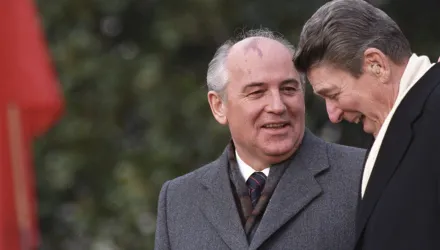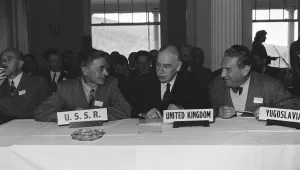International Security is America's leading peer-reviewed journal of security affairs.
This policy brief is based on "Europe’s Troubles: Power Politics and the State of the European Project," which appears in the Spring 2011 issue of International Security.
Bottom Lines
- Given the absence of a major geopolitical adversary, the Europeans are unlikely to seek to build a political or military union.
- The Europeans have little incentive to preserve their already fraying economic union.
- The events of the past decade have spurred French and German economic nationalism. Absent significant improvements in the economic situation—and such improvements are improbable—this trend is likely to continue.
Overview
The European project seems to have run aground of late. Observers want to know how likely it is that the Europeans will recommit themselves to establishing a political and military union, and what the future holds for the single market and single currency.
The answer is that the future of the European project looks bleak. There is little chance that the Europeans will take any real steps toward building a political or military union. The future of the existing economic union—the EU—is also unpromising. At best, it will continue to muddle along; at worst, it will continue to fray until it becomes a shadow of its former self.
The reason for this situation lies in the European balance of power. The creation and maintenance of the EU between 1945 and 1991 are best understood as a West European attempt to balance the awesome power of the Soviet Union. When the Soviet Union died so, too, did the rationale for European political, military, or economic union. With no threat on the horizon that looks anything like the Cold War Soviet Union, this is likely to remain the case for some time: the geopolitical situation gives the Europeans little reason to pursue political or military union or to preserve their economic union.
Explaining the European Project
Since its beginnings, the European project has reflected the balance of power. After World War II, neither France nor Germany could balance against the Soviet Union on its own. Moreover, the French and the Germans worried that the United States, which had stepped in to protect them after the war, might eventually withdraw its forces. Therefore, they formed an economic union, comprising a heavy industry pool, a common market, and a fixed exchange rate system. Their calculation was simple: in an age when economic might was the basis of military might, they had to establish an economic coalition; and because the Soviet Union was such a powerful adversary, that coalition had to take the form of a unified regional economy if it was to compete effectively. This meant taking the virtually unprecedented step of giving up sovereignty—the right to make policy autonomously— but the Europeans believed they had little choice if they wanted to defend themselves without U.S. help at a later date.
Similar calculations also prompted the Europeans to sign a treaty establishing a European defense community, which would have created a military union, and some hoped, a single European state. Giving up political and military sovereignty was a bridge too far, however, and France killed the project in 1954. Henceforth, the Europeans would rely on the United States and NATO for their military protection. Nevertheless, because they feared that they could not count on the United States indefinitely, they also formed the Western European Union, a purely European alliance that could be converted into a single military in the event of a U.S. withdrawal from the continent.
No major changes in the regional power architecture occurred between 1960 and 1990, so the Europeans did not alter the arrangements that they had crafted in the 1950s in any meaningful way. They cooperated in political and military affairs, but did not go for union in either realm. Meanwhile, the economic union evolved considerably, but did not undergo a fundamental transformation. Even the decision to begin negotiating a single currency in the late 1980s did not signal a seismic shift, only a modification of the existing system.
The Soviet collapse in 1991 radically altered the balance of power: since then the Europeans have not confronted an overwhelmingly powerful adversary. As a result, they have made no real moves toward political union. The much-touted constitution contained nothing that would have advanced the cause, and even then French and Dutch voters roundly rejected it in 2005. Dreams of a military union have also proved to be overblown. The Europeans have created several military institutions and even installed a "foreign minister." There is no European army, however, and all consequential foreign policy and defense decisions are subject to unanimity vote.
None of this is surprising. Nations consider real unification only when their very survival is at stake.
This is why the Europeans flirted with political and military union early in the Cold War. When the Soviet Union died, so did the prospect of a European superstate.
Indeed, absent an overwhelming threat, the Europeans have had little reason to maintain their economic union. This is not to argue that the demise of the Soviet Union has given them a reason to dismantle the EU—only that it has removed their incentive to preserve it. Consequently, the EU has started to fray as member states have put national interests ahead of those of the union.
The effects of this structural change did not manifest themselves in the 1990s because these were years of great prosperity in Europe. Given that Europe was experiencing robust growth and that leaders believed the introduction of the euro would perfect the single market thereby making them even richer, no one had a good reason to roll back the EU. Why kill the goose that seemed to be laying golden eggs?
As economic conditions have worsened since the turn of the century, however, the EU has shown unmistakable signs of strain. France and Germany, the key actors in the affair, have put national interests ahead of those of the union. Beginning in 2001, they refused to abide by the competition policy that was designed to promote a single European market and routinely violated the terms of the "stability and growth pact" underpinning the single currency. This revival of economic nationalism became even more pronounced in 2008 as Paris and Berlin feuded about how to deal with the financial crisis and rushed to protect their own industries and workers. The ensuing debt crisis provided further evidence of a trend toward national rather than European thinking. The Germans made it clear that they were tired of bailing out their profligate partners and refused to guarantee that they would do the same again in the future. For their part, the French proposed the creation of an "economic government," an organization that would be run by the member states and act as a counterweight to the independent European Central Bank.
Predictions
For the foreseeable future, there is no reason to think that the existing balance of power is going to shift, and therefore the Europeans are not going to confront an overwhelmingly powerful adversary.
This state of affairs means that there is little chance that the Europeans will take any real steps toward political or military union. The geopolitical architecture does not and likely will not provide an incentive for either course of action.
The Europeans will also continue to have little incentive to preserve their economic union. Thus, the EU's future depends on the health of the European economy. If the economic situation improves, the union will muddle along; if it does not, the union will continue to fray, possibly to the point where it becomes a union in name only. Indeed, member states may eventually reassert national control over matters of trade and money.
The economic situation is unlikely to improve, which means that more crises and therefore the further fraying of the union are virtually inevitable. Most commentators agree that the only way to fix the single market and save the single currency is to deepen and broaden the economic union and, ideally, to form a political union. The problem is that absent a major league adversary, there is no appetite for union in Europe and therefore little chance that the current setup will be repaired. As a result, the European economy could well run into trouble again. At that point even the demise of the EU is not out of the question.
Conclusion
There have been two profound shifts in the European balance of power since 1945. The first came as a result of World War II and triggered an institutional revolution. Faced with the awesome power of the Soviet Union, the Europeans surrendered their sovereignty and in doing so formed an exceptional set of institutions.
Just as the emergence of the Soviet Union as the only great power on the continent pushed the Europeans to make the EU, its collapse removed the incentive for union. Suddenly, they did not have to think about building a political or a military union; and they had no compelling reason to maintain their economic union. Therefore, as soon as it became clear that the EU was not delivering prosperity, France and Germany began to prioritize national interests, violate EU rules, and consider replacing the EU with an alternative that did not require an abrogation of sovereignty.
Provided there are no further shifts in the balance of power and the economic situation does not pick up—both fairly safe bets—the slow fraying of the EU that has been going on for a decade now will likely continue. This is not to say that cooperation is going to cease; there are plenty of reasons for the Europeans to work together. The current distribution of power, however, means that it is unlikely the EU will continue to survive in its current exceptional form.
Related Resources
Hix, Simon. What's Wrong with the European Union and How to Fix It (Cambridge: Polity, 2008).
Moravcsik, Andrew. The Choice for Europe: Social Purpose and State Power from Messina to Maastricht (Ithaca, N.Y.: Cornell University Press, 1998).
Parsons, Craig. A Certain Idea of Europe (Ithaca, N.Y.: Cornell University Press, 2003).
Reid, T.R. The United States of Europe: The New Superpower and the End of American Supremacy (Ithaca, N.Y.: Cornell University Press, 2011).
Sebastian Rosato is Assistant Professor of Political Science at the University of Notre Dame. He is the author of Europe United: Power Politics and the Making of the European Community (Ithaca, N.Y.: Cornell University Press, 2011).
International Security is America’s leading peer-reviewed journal of security affairs. It provides sophisticated analyses of contemporary, theoretical, and historical security issues.
International Security is edited at Harvard Kennedy School’s Belfer Center for Science and International Affairs and is published by The MIT Press.
For more information about this publication, please contact the International Security publications coordinator at 617-495-1914.
Statements and views expressed in this policy brief are solely those of the author and do not imply endorsement by Harvard University, the Harvard Kennedy School, or the Belfer Center for Science and International Affairs.
Rosato, Sebastian. “A Bleak Future for the European Project.” May 2011





